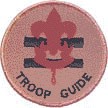|
The Patrol Method
The Patrol Leaders Creed
Junior Assistant Scout Master
Senior Patrol Leader
Assistant Senior Patrol Leader
Patrol Leader
Assistant Patrol Leader
Troop Guide
Instructor
Bugler
Chaplain Aide
Den Chief
Historian
Librarian
OA Representative
Quartermaster
Scribe
|
Troop Guide

General Information
Description:The Troop Guide works with new Scouts. He helps them feel comfortable and earn their First Class rank in their first year.
Comments: The first year as a Boy Scout is a critical time with new places, new people, new rules, and new activities. The Troop Guide is a friend to the new Scouts and makes first year fun and successful. This is an important position.
| Reports to: |
|
Scoutmaster |
| Type: |
|
Appointed by the Scoutmaster |
| Term: |
|
One Year |
Qualifications
| Age: |
|
15+ |
| Rank: |
|
Star or higher |
| Experience: |
|
None |
| Attendance: |
|
75% for all activities over previous 6 months |
| Confirmation: |
|
Appointment Approved by Scoutmaster |
Performance Requirements
| Training: |
|
You must attend the troop Junior Leader Training even if you have attended in the past. |
| Attendance: |
|
You are expected to attend 80% of all troop meetings, Patrol Leaders' Council meetings, outings, and service projects. If your attendance is low, or if you have three (3) unexcused absences in a row, you can be removed from office. |
| Effort: |
|
You are expected to give this job your best effort and use the adult leadership and advice when you feel they are needed. |
General Leadership Responsibilities
| Uniform: |
|
Set the example by wearing your uniform correctly. This means that you will wear all of the parts of the troop uniform, shirttail tucked in, with all required badges in their correct locations. |
| Behavior: |
|
Set the example by living the Scout Oath and Law in your everyday life. Show Scout Spirit in everything you say and do. |
| Attendance: |
|
Set the example by being an active Scout. Be on time for meetings and activities. You must call the Senior Patrol Leader or Scoutmaster if you are not going to be at a meeting or if you suddenly have to miss an outing. You also need to make sure that the someone (A patrol leader if possible) is ready to assume your responsibilities. This requires you to "Be Prepared", plan ahead and this will never be an issue. |
Specific Leadership Responsibilities
- Introduces new Scouts to Troop operations.
- Guides new Scouts through early Scouting activities.
- Shields new Scouts from harassment by older Scouts.
- Helps new Scouts earn First Class rank in their first year.
- Teaches basic Scout skills.
- Attends campout and works with new Scout Patrol when needed.
- Coaches the Patrol Leader of the new Scout Patrol on his duties.
- Works with the Patrol Leader at Patrol Leaders' Council meetings.
- Attends Patrol Leaders' Council meetings with the Patrol Leader of the new Scout Patrol.
- Assists the Assistant Scoutmaster with training.
- Counsels individual Scouts on Scouting challenges.
- Sets a good example.
- Enthusiastically wears the Scout uniform correctly.
- Lives by the Scout Oath and Law.
- Shows Scout spirit.
| Duties |
What it means in Troop 1 |
| Help Scouts meet advancement requirements through First Class in their first year. |
- Work with the AS PL (Programs) to develop and implement First Class Emphasis programs for new Scouts.
|
| Guide new Scouts through early Troop experiences to help become comfortable in the Troop and the outdoors. |
- Make sure the Instructors know what assignments they have been given by the staff.
- Help new Scouts become familiar with the way things are done by the patrol method in Scouting.
- Help maintain discipline.
|
| Advise new Patrol Leaders of his duties and responsibilities regarding new Scouts. |
- Help the new Patrol Leaders train their patrols so they can effectively operate.
|
| Attend the PLC meetings with new Patrol Leaders if needed. |
- Help new Patrol Leaders to prepare for the PLC.
|
| Work with other troop leaders to make the troop run well. |
- Make sure you know what you are supposed to do and do it well.
- Help whenever you can to maintain discipline.
|
| Prevent harassment of new Scouts by older |
- Make sure older Scouts dont take advantage of the new scouts.
|
| Keep others informed: |
- Talk to the new Patrol Leader each week to check they are following up on their assignments, to get information and feedback and to communicate program information.
|
| Set a good example: |
- Be the first to reflect the scout sign.
- Maintain a positive and enthusiastic attitude.
- Exhibit good self-discipline.
- Have a good attendance record.
- Meet your obligations on time and in full effort.
- Have fun but not at the expense of everyone. Goofing off without purpose wastes time and looses the interest and respect of the other scouts.
- REMEMBER: The troop will follow your example.
|
| Wear the uniform correctly: |
- Always conform to the Troop 1 uniform policy.
|
| Show Scout Spirit: |
- Use the Scout Oath and Law as an everyday guideline.
- Actively participate in the activities of Troop 1.
- Set an example for the other Scouts to follow.
|
|
